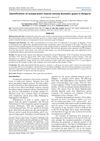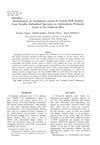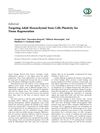 67 citations,
June 2018 in “Engineering in Life Sciences”
67 citations,
June 2018 in “Engineering in Life Sciences” Plant cell culture is a promising method for creating sustainable and high-quality cosmetic ingredients.
 20 citations,
April 2011 in “British Journal of Dermatology”
20 citations,
April 2011 in “British Journal of Dermatology” Reflectance confocal microscopy can tell apart white dots on the scalp as either sweat gland ducts or hair follicle openings.
 7 citations,
July 2013 in “International Journal of Dermatology”
7 citations,
July 2013 in “International Journal of Dermatology” No link found between Coxsackie viruses and pemphigus.
 April 2023 in “Veterinary world/Veterinary World”
April 2023 in “Veterinary world/Veterinary World” Six types of bugs were found on goats in Bulgaria, with Linognathus stenopsis being the most common.
 April 2018 in “The journal of investigative dermatology/Journal of investigative dermatology”
April 2018 in “The journal of investigative dermatology/Journal of investigative dermatology” Aging causes changes in scalp cells that can negatively affect hair health.
 116 citations,
December 2017 in “International Journal of Women's Dermatology”
116 citations,
December 2017 in “International Journal of Women's Dermatology” Adult female acne treatment should be personalized, considering individual preferences and pregnancy, using various topical and oral medications while managing side effects and resistance.
 39 citations,
July 2013 in “Journal of dermatological science”
39 citations,
July 2013 in “Journal of dermatological science” Hair microRNAs could be effective biomarkers for diagnosing scleroderma.
 24 citations,
May 2013 in “Drug Design Development and Therapy”
24 citations,
May 2013 in “Drug Design Development and Therapy” Multimodal minoxidil microemulsion is more effective in treating hair loss than minoxidil alone.
 23 citations,
February 2021 in “Journal of Endocrinological Investigation”
23 citations,
February 2021 in “Journal of Endocrinological Investigation” Betacoronaviruses, like COVID-19, may cause hormone system dysfunction and affect disease susceptibility and severity.
 23 citations,
January 2005 in “Nihon Ishinkin Gakkai zasshi”
23 citations,
January 2005 in “Nihon Ishinkin Gakkai zasshi” Nested PCR can reliably identify fungal infections when traditional methods fail.
 15 citations,
May 2011 in “Veterinary Dermatology”
15 citations,
May 2011 in “Veterinary Dermatology” Vitamin A might be a safe extra treatment for dogs with sebaceous adenitis, but more research is needed to prove its effectiveness.
 14 citations,
June 2019 in “BMC infectious diseases”
14 citations,
June 2019 in “BMC infectious diseases” A rare fungal infection on a child's scalp was successfully treated with antifungal medication.
 11 citations,
February 2021 in “Trends in Food Science and Technology”
11 citations,
February 2021 in “Trends in Food Science and Technology” Impatiens plants have health-promoting compounds and are used for natural food coloring, but more research is needed to understand their full benefits.
 4 citations,
September 2018 in “International journal of research - granthaalayah”
4 citations,
September 2018 in “International journal of research - granthaalayah” Most female students at Qassim University know about PCOS, but there are still misunderstandings about it.
 4 citations,
July 2015 in “Veterinary Dermatology”
4 citations,
July 2015 in “Veterinary Dermatology” Two types of 5α-reductase are in dog skin, which might make dutasteride better than finasteride for treating dog hair loss.
 3 citations,
January 2017 in “Stem Cells International”
3 citations,
January 2017 in “Stem Cells International” Adult mesenchymal stem cells can help regenerate tissues and are promising for healing bones, wounds, and hair follicles.
 2 citations,
May 2021 in “Case reports in dermatological medicine”
2 citations,
May 2021 in “Case reports in dermatological medicine” A 28-year-old man with type 1 diabetes had skin and hair issues due to zinc deficiency.
 1 citations,
April 2023 in “bioRxiv (Cold Spring Harbor Laboratory)”
1 citations,
April 2023 in “bioRxiv (Cold Spring Harbor Laboratory)” Climate-related nutritional stress may cause hair loss in juvenile male Guadalupe fur seals.
 February 2024 in “Bangladesh pharmaceutical journal”
February 2024 in “Bangladesh pharmaceutical journal” The conclusion is that the tested yogurts from Bangladesh are rich in vitamins thiamine and riboflavin, and the testing method is reliable.

False daisy is a medicinal herb with many health benefits, including hair growth promotion.

Plant roots respond to fungus smells by possibly using certain proteins and a plant hormone to change root growth, but more research is needed.
 June 2020 in “The journal of investigative dermatology/Journal of investigative dermatology”
June 2020 in “The journal of investigative dermatology/Journal of investigative dermatology” Platelet-rich Plasma Gel may help treat en coup de sabre scleroderma, improving symptoms and skin quality with minimal side effects.
 September 2018 in “Asian journal of pharmacy and pharmacology”
September 2018 in “Asian journal of pharmacy and pharmacology” Honey has many health benefits and is good for you.
 November 2014 in “John Wiley & Sons, Ltd eBooks”
November 2014 in “John Wiley & Sons, Ltd eBooks” Eating high-glycemic and dairy foods can increase hormones that may cause acne and other health issues.

Chemicals and stem cells combined have advanced regenerative medicine with few safety concerns, focusing on improving techniques and treatment effectiveness.
 September 1998 in “Journal of The European Academy of Dermatology and Venereology”
September 1998 in “Journal of The European Academy of Dermatology and Venereology” Phototrichogram helps assess hair loss severity.
 233 citations,
February 2018 in “Polymers”
233 citations,
February 2018 in “Polymers” Chitin and chitosan are useful in cosmetics for oral care, haircare, and skincare, including UV protection and strength improvement.
 165 citations,
January 2014 in “Dermatology Research and Practice”
165 citations,
January 2014 in “Dermatology Research and Practice” Zinc is effective for treating various skin conditions, including warts and acne.
 153 citations,
November 2004 in “Current Medicinal Chemistry”
153 citations,
November 2004 in “Current Medicinal Chemistry” The document concludes that Catalyst software is effective for drug design, identifying potent compounds for various medical conditions.
 124 citations,
October 2019 in “Frontiers in Immunology”
124 citations,
October 2019 in “Frontiers in Immunology” Janus kinase inhibitors are promising treatments for autoimmune skin diseases like eczema and psoriasis.






























